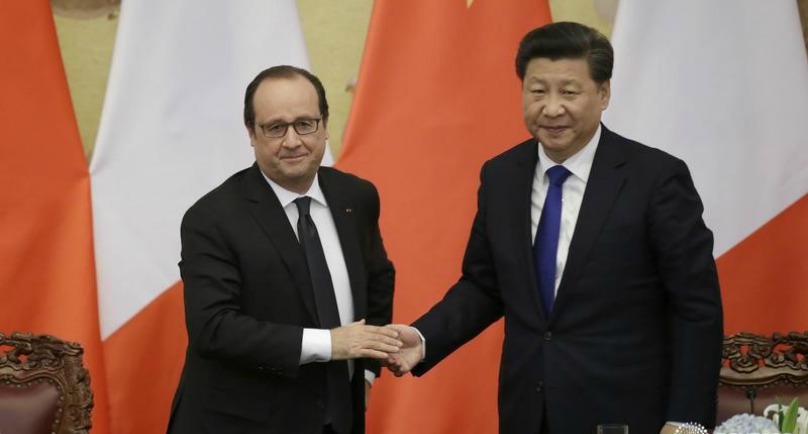Image: France’s President Francois Hollande shakes hands with his Chinese counterpart Xi Jinping (R) after a joint news conference at the Great Hall of the People in Beijing, China, November 2, 2015. REUTERS/Jason Lee/Pool
By Megha Rajagopalan
BEIJING (Reuters) – China and France agreed on Monday to push for long-term monitoring of a U.N. accord to combat climate change due in Paris next month by reviewing cuts in greenhouse gas emissions every five years.
Chinese President Xi Jinping agreed the timetable with summit host French President Francois Hollande, who is visiting China, as part of a joint plan to put the world economy “onto a low-carbon path in the course of this century”.
Top greenhouse gas emitter China agreed with France to stock-taking “every five years and in a comprehensive manner of overall progress made toward reaching the agreed long-term goals” in Paris, a joint statement said.
“The most important kernel … has both parties committing to taking stock every five years,” said Jennifer Morgan, of the U.S.-based World Resources Institute think-tank.
She said Beijing had not previously spelt out its hopes for monitoring any deal in Paris. The European Union has argued strongly for reviews of every national plan every five years.
More than 150 nations have issued national plans for curbing greenhouse gas emissions until 2025 or 2030 in the run-up to the summit. But a draft text of the Paris deal is unclear about how the pledges will be tracked.
“We are in a fully optimistic mood as to the success of the Paris conference,” Xi told a joint news conference with Hollande. Their joint accord also foresees talks in 2017-18 to review progress and ways to enhance action before 2020.
The deal adds details to China’s policies. Last year, China agreed to peak its emissions by around 2030, but has not yet said at what level.
The United Nations says that it is already clear the pledges by all governments to shift from fossil fuels will be insufficient to get on track to limit rising temperatures to a U.N. goal of 2 degrees Celsius (3.6 Fahrenheit) above pre-industrial times.
The United Nations says that means it will be essential to have a mechanism to ratchet up action after Paris to rein in emissions, blamed by the U.N.’s climate science panel for droughts, heatwaves, downpours and rising sea levels.
Jean-Francois Julliard, of Greenpeace France, said Xi and Hollande’s accord fell far short of the environmental group’s hopes for a shift to 100 percent renewable energies from fossil fuels by 2050.
“This is no time for champagne,” he said in a statement.
(Writing by Alister Doyle; editing by Andrew Roche)
Copyright 2015 Thomson Reuters. Click for Restrictions.


